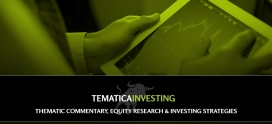Closing out an option position while making a move on a Cash-Strapped Consumer player
Yesterday afternoon we received the latest musings from the Federal Reserve — one of a few drivers of the recent stock market rally — that essentially confirmed an April rate hike is off the table and it will proceed more cautiously until the global economy picks up steam. Based on the growing number of stimulative efforts, which include the much talked about move by the European Central Bank, the rate cut in India earlier this week, and others, odds are the soonest we may see such steam is toward the middle of the year. As you can imagine, this was music to the stock market’s ears as it resumed its upward trajectory upon receiving the Fed’s March meeting minutes.
That dinged our more protective positions, such as our inverse ETFs and our short position in Paccar (PCAR) shares, but the market elation was short lived given more cautious commentary emerging from not only the Fed, but the International Monetary Fund warning of another emerging market crisis, as well as comments from Haruhiko Kuroda, the Bank of Japan’s governor, that suggested the central bank could ease policy even further. That potential easing follows an interest rate cut earlier this week in India, which to us underscores the growing economic unease across the globe.
On this news, our protective ETFs — ProShares Short Dow30 ETF (DOG), ProShares Short S&P 500 (SH) and ProShares Short Russell2000 (RWM) — as well as our short position in Paccar (PCAR) shares are rebounding today. Given the high probability that March quarter earnings will be a repeat of sorts for what we saw with December quarter earnings, we will continue to keep all four of those positions on the Tematica Pro Select List as we see more upside ahead.
Closing TLT calls with a win
One of the biggest mistakes when trading is to be a pig, sorry to say it, but it’s true. Today’s market had led to a mighty surge in our iShares Barclays 20+ Year Treasury Bond ETF (TLT) April $130 calls (TLT160415C00130000), which are up more than 50 percent, bringing the overall return to up more than 75 percent since adding the calls to the Tematica Pro Select List. With these calls due to expire next week, we are exiting the position and booking a solid win in the process. We recommend you do the same.
As we make this move with that April call position, we must acknowledge the frustration we feel and suspect you do as well with the PowerShares DB US Dollar Bullish ETF (UUP) April $25 calls (UUP160415C00025000) especially given the amount of additional monetary easing we’ve cited in recent weeks. As with the TLT calls, the UUP April $25 calls will expire next week, and in our view we will let them do just that as it would cost more to trade the position than to simply let the calls expire unexercised. Given the bout of easing, we will continue to hold our UUP June $25 calls (UUP160617C00025000), and will look to scale into the position to improve the cost basis over the coming weeks.
Adding Costco Wholesale (COST) shares to the Tematica Pro Select List
We suspect most have heard of Costco Wholesale (COST), but for those that haven’t had the pleasure of walking the company’s cavernous stores, the company is a membership warehouse club, focused on bringing the best possible prices on quality, brand-name merchandise to its members. We here at Tematica are fans of the company given our first hand experience shopping at various Costco locations, but also as investors because Costco is a prime beneficiary of our Cash Strapped Consumer investing theme. Consider that:
- According to Dollar General (DG), 60% of Americans don’t have a savings safety net of $1000 and 20% don’t have a savings account at all.
- Wage growth has been muted this recovery, with other costs, like healthcare, sapping purchasing power despite the benefit from lower gas prices.
- More than 40% of the roughly 22 million Americans who borrowed from the government’s main student-loan program aren’t making payments or are behind on more than $200B owed, according to a quarterly snapshot of the Department of Educations’s $1.2 trillion student-loan portfolio.
- The rate of seriously delinquent subprime car loans soared above 5% in February, according to Fitch Ratings. That’s worse than during the Great Recession and the highest level since 1996.
- In yesterday’s Tematica Investing we shared the following – “According to Pew, a decade ago a poor family in the lower third of the scale, had about $1,500 per year in extra income. Today, they are $2,300 in debt, and that figure is rising. This matches reports that credit card debt is rising rapidly.”
The bottom line is these and other Cash Strapped Consumers continue to look for ways to stretch their disposable spending dollars, and Costco’s warehouse is a prime beneficiary. We saw this in February when Costco’s same-store-sales rose +4% for the month, which was head and shoulders above the 0.1% contraction in overall February retail sales reported by the Commerce Department. Even after adjusting for the drop in gas prices included in the Commerce Department’s findings, the data shows Costco easily took wallet share during February. This morning Costco reported its March same-store-sales and we expect similar results to be had when we compare those figures with soon to be released March Retail Sales.
There are also several company specific drivers that should benefit COST shares. The company is on track to open additional locations when it announced it bought a 175,000-square-foot warehouse in Northeast Minneapolis and plans to convert the building into one of its Business Center stores. As you’ve probably read in recent headlines, Costco and American Express (AXP) have ended their relationship. We’ started to get more clarity on the coming Costco credit card switch to Citigroup (C)/Visa (V), and early reviews are very favorable. Reward terms for the new card include 4% cash back on up to $7,000 of gasoline purchases per year (AmEx offered 3% on up to $4,000) and 3% cash back on restaurant purchases versus 2% from AmEx. We expect Citigroup and Costco will tout these rewards and use them to drive membership as well as spending both inside and out of Costco stores. The news of these benefits prompted Oppenheimer to boost its price target on COST shares to $175 from $160. Our price target on COST shares is $170.
The bottom line is we see the risk-to-reward profile in COST shares skewed toward the upside and see the company’s business benefitting from a challenging economic environment as it looks to expand its offering, including those like fresh food and organics, to shrink time between customer visits. As we add COST shares to the Tematica Pro Select List we will also set a protective stop at $135.
Because of the high probability that we will experience a rocky March quarter earnings period, which could whipsaw call options around rather quickly — much like we saw this past January and February — we will hold off adding a call option position on COST shares near-term.




